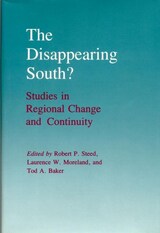
There is widespread agreement that the South has changed dramatically since the end of World War II—the essays in The Disappearing South address the ongoing debate
There is widespread agreement that the South has changed dramatically since the end of World War II. Social, demographic, economic, and political changes have altered significantly the region long considered the nation’s most distinctive. There is less agreement, however, about the extent to which the forces of nationalization have eroded the major elements of Southern distinctiveness. Although this volume does not purport to settle the debate on Southern political change, it does present a variety of recent evidence that helps put this important debate into perspective. In the process it helps clarify the contemporary politics of the South for readers ranging from the scholar to the more casual observer.
The essays in The Disappearing South address the ongoing debate. Contributors, in addition to the editors, include E. Lee Bernick, Earl Black, Merle Black, Lewis Bowman, Edward G. Carmines, Patrick Cotter, Thomas Eamon, Douglas G. Feig, John C. Green, James L. Guth, William E. Hulbary, Anne E. Kelley, Lyman A. Kellstedt, David M. Olson, John Shelton Reed, Harold Stanley, James G. Stovall, John Theilmann, Stephen H. Wainscott, and Allen Wilhite.

of an informed and involved electorate freely and rationally choosing its public
officials seems to be at odds with American political reality. Thus the questions:
On what basis do people vote and form opinions? How does the lack of information
at the individual level affect system performance? In this collection twenty-six
distinguished political scientists discuss, debate, and define the relationship
between information and the democracy it supposedly serves. The contributors
address both the empirical and normative aspects of governing in the United
States, employing psychological, sociological, and economic perspectives.

If white Americans could reveal what they really think about race, without the risk of appearing racist, what would they say? In this elegantly written and innovative book, Paul Sniderman and Edward Carmines illuminate aspects of white Americans' thinking about the politics of race previously hidden from sight. And in a thoughtful follow-up analysis, they point the way toward public policies that could gain wide support and reduce the gap between black and white Americans.
Their discoveries will surprise pollsters and policymakers alike. The authors show that prejudice, although by no means gone, has lost its power to dominate the political thinking of white Americans. Concentrating on the new race-conscious agenda, they introduce a method of hidden measurement which reveals that liberals are just as angry over affirmative action as conservatives and that racial prejudice, while more common among conservatives, is more powerful in shaping the political thinking of liberals. They also find that the good will many whites express for blacks is not feigned but represents a genuine regard for blacks, which they will stand by even when given a perfectly acceptable excuse to respond negatively to blacks.
More crucially, Sniderman and Carmines show that the current impasse over race can be overcome if we remember what we once knew. The strongest arguments in behalf of equality for black Americans reach beyond race to the moral principles that give the issue of race itself a moral claim on us.

In this wide-ranging assessment of democracy in America today, fifteen respected scholars of American politics chart the strengths and weaknesses of the nation’s democratic mechanisms and outline the challenges that lie ahead. They focus not on specific policies or elections but on the quality of American political life, the representativeness of its governing institutions, and the issues of racial and economic equity.
The contributors cover a broad spectrum of the American political process. Topics include the extent and nature of political participation, the relevance of political parties, political fundraising and its policy consequences, demographic change and its likely effect on the national political agenda, and the future of racial politics. Others explore how representative Congress really is today, how the market economy affects public policy, the use of impeachment as a political weapon, and the degree of corporate influence on the political process. A final chapter explores the circumstances likely to shape policy agendas over the course of the twenty-first century.
Taken together, these essays provide a clear picture of political evolution during the past fifty years and discuss possible problems and issues of the future. Written for advanced undergraduate and graduate students, the book is a thoughtful, well-documented, critical analysis of contemporary American democracy.
READERS
Browse our collection.
PUBLISHERS
See BiblioVault's publisher services.
STUDENT SERVICES
Files for college accessibility offices.
UChicago Accessibility Resources
home | accessibility | search | about | contact us
BiblioVault ® 2001 - 2024
The University of Chicago Press









